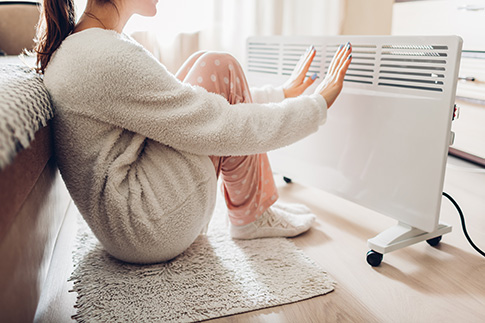Winter heating: Simple tips for a more comfortable home

In winter, a few simple adjustments to your daily habits can improve your home comfort while helping you reduce your heating costs. Learn how to optimize temperature control, humidity, insulation and heat circulation so you can enjoy a better-heated home—without overconsuming energy.
What is the ideal indoor temperature in winter?
The ideal temperature depends on your personal comfort level. But generally, a setting between 20°C and 22°C suits most homes. You can increase it to 24°C if you tend to feel cold easily. Don’t forget to lower the temperature at night or in unused rooms, ideally between 18°C and 19°C.
How can you reduce your heating bill?
These simple actions can improve your comfort while helping you reduce your energy consumption and winter heating costs.
Install electronic thermostats
Choose programmable thermostats (or non-programmable but electric). They’re more precise and can reduce heating costs by about 10%. Also lower your thermostat by just 1°C. It will barely affect your comfort, but it will noticeably reduce your utility bills.
Adjust your home’s humidity levels in winter
Relative humidity (RH) should not fall below 30% in winter, according to Health Canada. Air that’s too humid affects comfort, air quality and even your health.
Tip: If humidity levels rise too high, increase ventilation—open a window or use a fan.
Check your home’s insulation and air sealing
During very cold winter weather, even a small gap or air leak can significantly reduce comfort and increase your heating bill.
- Check the weatherstripping on doors and windows and replace it if needed.
- Replace broken window seals (thermopanes). It’s much cheaper than replacing all your windows.
- Cover drafty windows with plastic window film.
- Close the exterior air-exhaust vents properly (dryer, kitchen range hood, bathroom fan).
Make the most of renovation projects to improve your insulation (especially in the attic). If you replace your doors and windows, choose ENERGY STAR®-certified products.
Tip: Look into home renovation grants. Several financial assistance programs support energy efficiency improvements.
Improve heat distribution in each room
Rearrange your interior layout to improve your winter heating performance.
- Keep furniture such as sofas, dressers and bookcases at least 20cm to 30cm away from radiators to avoid blocking hot air.
- Open your curtains (or blinds) during the day to let in the sun’s heat, then close them as soon as night falls. Curtains create an insulating barrier that reduces heat loss through windows.
When should you use a space heater in winter?
Should I hire a professional to maintain my heating system?
Yes. Maintenance performed by a qualified contractor ensures the performance and safety of your system.
A central heating system requires annual maintenance. A fully electric heating system can be checked every 3 to 5 years.

“A full maintenance appointment generally takes two to three hours. Be cautious of “express” tune-up packages that only last a few minutes and are often advertised at low cost. They cannot properly inspect the essential components of your system. They create a false sense of security and are not enough to guarantee the performance, reliability and safety of your heating equipment.”
Yves AllardAssistant Director, Residential, CAA-Quebec
Do a few simple maintenance tasks yourself
Some tasks can be performed without a specialist and will directly improve your heating efficiency.
Hot-water heating system
- Bleed your radiators using the screw on top to remove trapped air.
- Insulate pipes running through unheated areas.
Forced-air heating system
- Clean or replace the air filter regularly.
- Check duct sealing: Well-sealed joints allow warm air to reach every room more efficiently.
Heat pump system
- In the first few years: Clean the coils annually and clean the filters every season.
- After 5 years: Have the motor, fans and refrigerant inspected.
Electric baseboards and convectors
- Vacuum the heating element and fan blades (if applicable).
- Always cut the electrical power before cleaning.
Do I need to notify my home insurance provider if I modify my heating system?
Yes. Inform your insurer if you upgrade your heating system or add a supplemental heating appliance—fireplace, stove or other. This will have little impact on your home insurance premium, but it ensures proper coverage if a loss occurs.

Benefit from personalized advice
Do you have questions about your home, need specific information, or are you looking for referrals to find an Approved Supplier?
